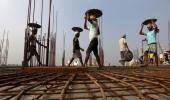The idea of three capitals has not been abandoned, even as the state lurches from financial crisis to crisis.

One capital or three? No one in Andhra Pradesh is clear.
But instead of Amaravati, for the moment, the state capital will be Visakhapatnam.
At the curtain-raiser to the AP Global Investors Summit, Chief Minister Y S Jagan Mohan Reddy announced Visakhapatnam would be the capital and he himself was moving there.
Till when: For his remaining term as chief minister? Till the investor meet (in March)? For the rest of 2023 or even longer? No one knows.
In 2021, he had said Andhra Pradesh would have only one capital -- Amaravati -- for now.
In the face of multiple judicial challenges, Mr Reddy told the assembly the government was withdrawing legislation to create three capitals -- Visakhapatnam (the executive), Kurnool in the Rayalaseema region (the judicial), and Amaravati (the legislative), which was to house the governor's office and the assembly.
The idea of three capitals was to ensure 'decentralised development' in the state.
All it seems to have caused is monumental confusion.
It all began with the division of Andhra Pradesh and Hyderabad becoming the capital of Telangana.
N Chandrababu Naidu's Telugu Desam Party saw an opportunity.
The former chief minister visualised the construction of a green field, futuristic, and world-class capital city, Amaravati.
This was to be modelled on Singapore and its master plan was assisted by two Singapore government-appointed consultants.
The city was to cover 217 square km and was to be developed at an approximate cost of $8 billion.
The unstated subtext was that land around Amaravati was owned by wealthy Kamma farmers, who are also backers of the TDP.
The net loser was the Reddy community, the other politically powerful and land-owning caste in AP.
Once Amaravati was announced as the capital, the land around the region shot up several hundredfold in value and transfers of titles and change of land use followed at breath-taking speed.
However, elections intervened before Mr Naidu's plans could fructify.
That they were riddled with loopholes and angles is another story.
Out of nearly 54,000 acres identified for the city, 42,000 acres was cultivated land, and, of that, 40,000 acres was irrigated land.
Farmers stood to lose land, but were expecting to make a killing from compensation.
Those who were most worried were the farm-based labour, the leaseholders.
Moreover, the entire area was rich black cotton soil prized for agriculture but a marsh for purposes of construction.
Mr Naidu's party was voted out in May 2019 and Jagan Mohan Reddy stormed to power.
The Reddy cohort dominant in Rayalaseema saw this as an opportunity to correct the power imbalance that had followed two previous terms of Kamma/TDP rule.
Seizing on the recommendations of several previous committees, Mr Reddy instituted a few.
As he wrestled with the one signature move that would slay the TDP and at the same time cement his own dominance, he hit upon the scheme of three capitals.
One of them was to be located in Rayalaseema.
But problems followed soon: The very problems that had led to the earlier rejection of the idea.
A state government has no authority to legislate on the location of a high court.
So the idea of shifting the high court out of Amaravati was complicated.
But there was also the cost factor. The centrepiece of the YSRCP government is welfare. But welfare costs money.
How was compensation to be paid -- not just for Amaravati, but also for Kurnool and Visakhapatnam -- if the state had no money?
The truth is it has no money. Conservative estimates put the value of the acquired land today at around Rs 1.5 trillion.
Compensation has to be paid at 150 per cent of the value. The state's debt is 33 per cent of GSDP.
Much of it is based on shell companies established for the purpose of developing the capital.
Core revenues of the state government are securitised to banks.
This is already telling on the finances of the state in the most basic ways.
Some state government employees have not got salaries for up to four months.
Pensioners are also paid around the 20th of the month.
Shamsher Singh Rawat, special chief secretary (finance) in the Andhra Pradesh government, conceded in a press statement that 'only on rare occasions' had there been a 'slight delay' in paying salaries. In most cases, 90-95 per cent of the salaries are released before the fifth of every month, he said.
In the middle of all this, there's a new capital: Visakhapatnam. The idea of three capitals has not been abandoned. It is merely on hold.
But the state lurches from financial crisis to crisis.












 © 2025
© 2025